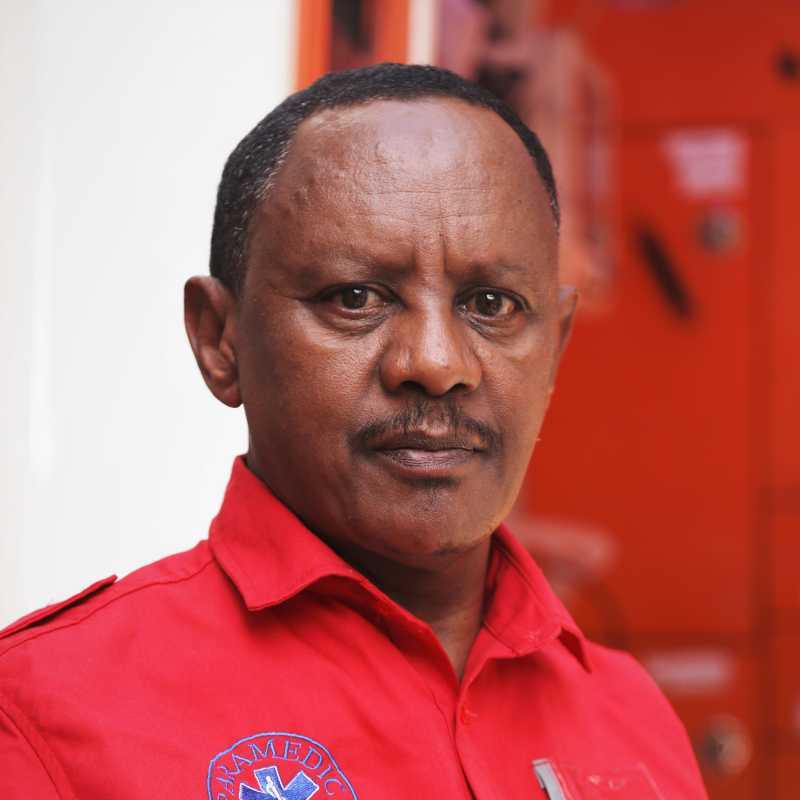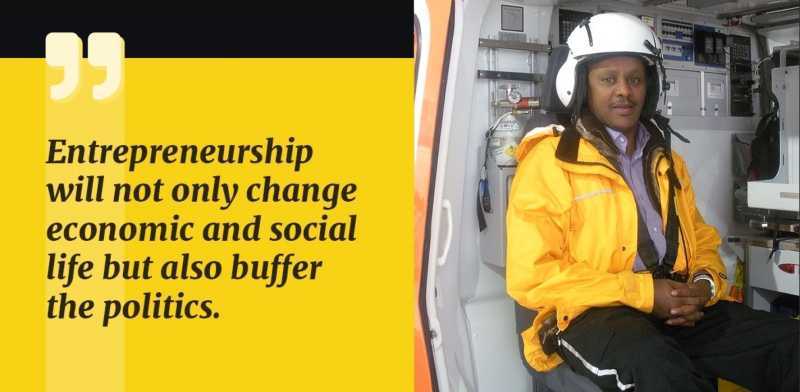Kibret Abebe – Fearlessly in business

Here is an inspiring piece from Loline's interview with Mr. Kibret. This is a story of making it in business despite all odds being against you.
"Think big, start small, act now!"
He is the president of the Ethiopian Social Enterprises Association, pushing for ways to ease the rough road to entrepreneurship. He is also a consulting board member of the Job Creation Commission. In addition, he serves as a board member of the Addis Ababa Chamber of Commerce. He is not just titled; however, he has been tremendously successful in a series of medical entrepreneurship.
Mr. Kibret Abebe is not idealistic but speaks from his life. He has challenged the stereotype of business people being greedy. He has built wealth while honestly serving his community. This great social entrepreneur has not just founded companies; he aspires to instill a different attitude. He believes in business models being a key to solving our country's plethora of problems. For him, it is a little about governmental and non-governmental handouts.
Born and raised in Addis Ababa, Mr. Kibret was the sixth of twelve children born into the family. His entrepreneurial urges could have come from his late dad, who used to breed cattle, viticulture, and apiculture. When graduating from high school, he did not get the point that was needed to join university and ended up joining Jimma Health Science College to attain a nursing diploma. He went to Bale, about 600 kilometers from Addis Ababa, and served five years there. That exposure, Mr. Kibret says, gave him the benefit of discovering himself.
He had been upset about his results, and he honestly felt like he was not his best self in the nursing profession. The driven young man retook the exam and scored a remarkable 3.8. This allowed him to go work at Tikur Anbessa. He later joined the school of Anesthesiology, and he loved it. He realized the real-time decision-making and strict discipline typical of the field fitted him well.
He furthered his studies by doing his degree in Social Science at Addis Ababa University. Mr. Kibret continuously worked towards self-development, taking various training, including a prominent one on strategy from an internationally recognized institution. He also became the first Ethiopian to be a fellow at Acumen in 2015. His clinical studies, blended with his social science schooling, expedited his entrepreneurial endeavors.
After graduating in Anesthesiology, Mr. Kibret worked for 17 years at Tikur Ambessa, perfecting his art of real-time medical practice. He told us that he spent the first two years laboring in his profession until he became a trusted name in the field. "A split-second decision could mean life or death," he explained the strictness of the practice. Standing tall in all that pressure, he built such a reputation that he got part-time contracts at five other private health care centers.
Taking multiple jobs, Mr. Kibret's finances were looking good. He owned a house and afforded a better life for his family. However, his dreams were too big to stay content. Mr. Kibret was always bothered by the poorly functioning Emergency Medical Services in Ethiopia. People usually overlook the significance of pre-hospital care, which could save thousands of lives.
The data he then found showed a staggering 96% of people did not use ambulances to come to health care centers. This meant a great number of lives were lost, especially in emergency cases. As someone who openly counters people who use education to feed their ego rather than bring practical fixes, he strived for ways around this everyday challenge. He kept thinking about how he could be a part of the solution. He read anything he could find on how global EMS (Emergency Medical Services) operated. Research and thoughts formed into Tebita, an Emergency Pre-hospital Medical Services Plc.
Mr. Kibret is always on his toes. He knew what he wanted and has long been preparing for his eventual venture. He once had to go to England for a work trip. Looking back, people thought he would use the chance to ask for asylum and leave the country for good. That was not what he wanted for his life. He went on striving toward his dream. He had his driving license when he could barely afford a car. He said in sharp words, "Opportunities won't be looking for you; you look for them." When he felt it was his time, he jumped right in.
Moving on from his 17 years at Tikur Anbessa General Hospital, he embarked on his long thought quest. It was one bold step leaving behind the security employment provided for his family. You can see it was from his heart when you learn how much he had to go through. His peers told him it was ridiculous. The government simply had no place to even process the idea. None of it held him back.
Tebita means droplet in Amharic. Mr. Kibret believed in contributing one's small part. The problem is colossal, he admitted, but that should not intimidate people from doing what they can. Tebita is not just a firm but has embodied this thinking. He set out to organize a system of accessible, high-quality, and affordable services, and he did.
If not for the resoluteness of Mr. Kibret, Tebita would have never come to be. To begin with, his colleagues were mostly cornering him and mocking his project. Moreover, his proposal was not well received by the Ministry of Health, which told him there was no framework to license and regulate his idea. They directed him to opt out of it and establish an NGO.
As an ardent believer in businesses being true agents of sustainable change in society, he refused to work in an aid organization. It took him six months to convince the Ministry of Health to give him a shot. The ministry had no guidelines, so Mr. Kibret prepared a 17-page regulatory document and passed it on for approval. He then got the license.
Finance was another hurdle that finally made him sell his house and buy ambulances. He needed to do a lot of convincing his wife as there was so much at stake. With two drivers and him working as an EMS professional, Tebita launched. For the first five years, Mr. Kibret was also a driver and a call center operator, stretching himself to get things running.
Now operating with fifteen vehicles, sixty-seven permanent employees, and twenty-seven others on a temporary contract, Mr. Kibret's resilience has molded Tebita into an inspirational story. Their 24/7 services became a pioneer as a private firm in the sector.
They have diversified since then. They provide remote medical assistance outside Addis Ababa to big companies like Total, TAF oil, and Simmons & Simmons. Home care services have been added to the menu as well. The integrated first aid training is another course they undertake, which Mr. Kibret described as the most lucrative. Tebita had worked with the UN, AU, and Safaricom in this program.
A Paramedical College is one of the impactful establishments of Tebita. They have a project running for six years in collaboration with the Norwegian Partnership for Change. They give scholarships to sixty up to ninety students every year for training in advanced EMS. Mr. Kibret believes in how crucial these professionals are for the sector.
Mr. Kibret sounded unrelenting when he mentioned the manufacturing plant they have recently begun. It is for manufacturing first aid products as a substitute for large-scale imports. They have also been involved in transforming ambulance cars into basic life support units. This is a significant private-public partnership Tebita did with ALERT and the Ministry of Health.
Mr. Kibret told us his aspirations to revolutionize the emergency medical services field keep him going. He seems to have found an optimal ground doing this. It is not the commonly distorted notion of being greedily in business but something he describes as impactful profiting. He passionately believes in bettering all aspects of our country through creating work opportunities.
His interest is not bound to the medical field. He said in strong words, "It is not shameful to not be able to get medicated; it is shameful to not be able to feed one's self." In his belief, the best way to make the country safer is by creating entrepreneurial mindsets. He continued, "When people have that attitude of purpose and creating opportunities for others, they are not violent." He told us how people with a shallow understanding of life get trapped thinking they are being used and abused, while the purpose of life is being of use to others.
At 50, Mr. Kibret is so enthusiastic about speaking of his visions that it gets contagious. He told us the first is a ground ambulance service that stretches from Gambella to Jigjiga. The second one is making Tebita Paramedical College an East African center of excellence. He is also into improving the efficiency of the supply chain by getting into manufacturing at a larger scale. The other one he mentioned is establishing a trauma treatment center while he finally disclosed his ambitious air ambulance services.

As optimist as Mr. Kibret is, he is not naïve about the situation in Ethiopia. He had his story of having been given a cold shoulder by the government. He had suffered from bureaucracy and inappropriate politicization. He criticized the government for failing to provide services and products that can measure up to standards.
When the pandemic was growing global and about to hit Ethiopia, Tebita had proposed to produce medical clothing. The ministry of Health resoundingly disappointed Mr. Kibret rejecting his collaboration efforts. As the first cases were reported, Tebita, however, came to the rescue and served a whole year with only half the expense covered by the Ethiopian Insurance Company. For Mr. Kibret, even if not recognized, being of that service was a great honor, he told us.
He also touched on the overrated aid issue. The social entrepreneur emphasized how a country's development is business-led and not aid-driven. He added that if aid should be given, it should be to support ventures that provide people opportunities for sustainable improvement of their lives. Generally speaking, Mr. Kibret believes the government should do better at facilitating businesses.
Mr. Kibret described how people who often talk about problems are taken to be contemplative while the optimist is considered ingenuous. He is a critic of this perception. He tried to make his point by showing how it is futile to talk about challenges over and over again. Then he added what is rather important is transforming those challenges into opportunities.
Mr. Kibret said, "Many people hold back their dreams out of fear." As someone whose idea was highly condemned by his work partners, he says it is about proving them wrong by accomplishing things you set out to do. He advised the youth to be courageous to do whatever is morally acceptable, legal, and makes them happy. He built on that, saying it is such a waste of time doing what one does not love. People should always go for things they enjoy, even if they won't be recognized by many.
